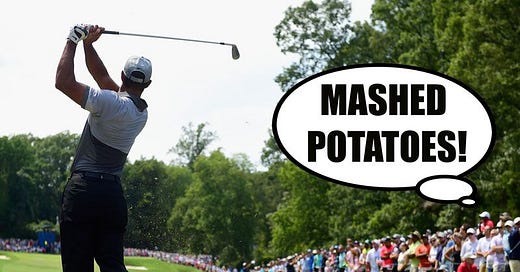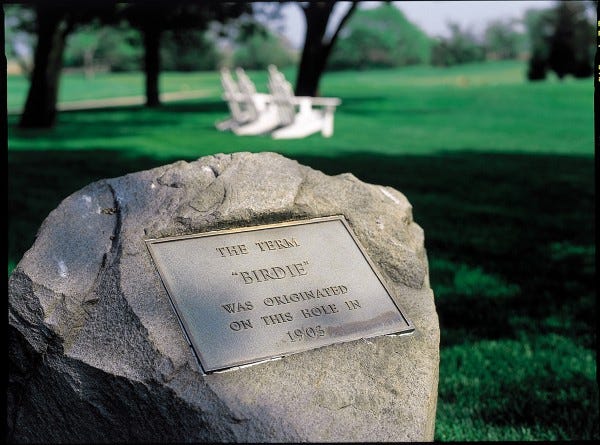The Origin of Common Golf Phrases
Golf has long been associated with its own unique vocabulary, leaving beginning golfers wondering what exactly is being said by their playing partners and at the PGA/LIV Tour event they are attending. We hope to explain the meaning of common golf phrases and their origins below.
Mashed Potatoes
What started as an obscure chant to help a mother watching golf on TV identify her son in attendance has turned into a golf phenomenon. First yelled at the 2011 Chevron after Tiger Woods struck a 2-iron stinger off the tee, "Mashed Potatoes" now commonly follows hard-hit drives from the tour’s longest hitters.
Light the Candle
The exact date of the first lighting isn’t recorded, but the phrase came to be sometime in 2012, shortly after the 2011 favorite “Mashed Potatoes.” Much like "Mashed Potatoes," its actual reference to golf and its meaning are unknown.
Birdie
Atlantic City Country Club has been home to many firsts, including being the “Birthplace of the Birdie” and the first “Eagle.” The origins of this term vary slightly, but the gist is that during a round in 1903, Abner “Ab” Smith launched a long approach shot on ACCC’s par-4 12th hole (now No. 2) that wound up within kick-in range of the cup. The result caused one of the group’s members (Ab’s brother William and Pine Valley architect George Crump rounded out the threesome) to exclaim it was a “bird of a shot!” At the time, “bird” was slang for something pretty swell or really neat, or whatever else they said at the turn of the 20th century.
Par
The word "par" officially entered the golf lexicon in 1911 when the USGA put it in play. But the word itself was around long before that. Generally, "par" was used when talking about stocks, as in, "a stock may be above or below its normal or par figure," according to the USGA. For golf purposes, the USGA defined "par" as "the score that an expert player would be expected to make for a given hole. Par means expert play under ordinary weather conditions, allowing two strokes on the putting green." Prior to the 1900s, "par" was actually a term used interchangeably with "bogey," but "bogey" was the term more universally used. Eventually, it was decided that "par" should be used to identify the "ideal score" on a given hole, while "bogey" would be the term used to describe a score that recreational golfers would be happy with.
I’ve Abandoned My Child
The phrase "I’ve abandoned my child" is a powerful and emotionally charged statement, particularly known for its use in the film There Will Be Blood, where Daniel Day-Lewis's character, Daniel Plainview, delivers it with intense conviction.
While the phrase doesn’t hold quite the same gravity when yelled from three rows deep at this week’s PGA Tour or LIV event, it has become a mainstay in golf vernacular. The first use of the phrase appears to have been during the 2022 Open Championship after a Jordan Spieth iron shot.





